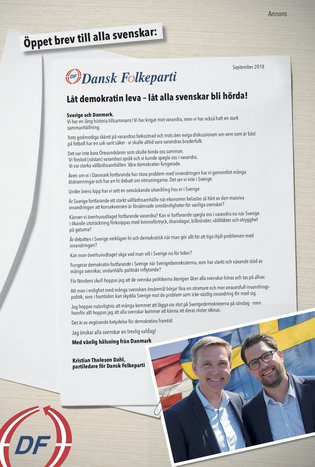Democracy in the shadow of populism - a Nordic way out?
The “Nordic model” is often presented as a solution to the dominance of neoliberalism and the rise of populism. Populist tendencies within the region, including the reclaiming of nationalist identities and anti-immigration and anti-globalisation sentiment, can often be overlooked by outside observers. Whereas elsewhere economic crises encourage states to bow to market forces at the expense of democracy, the Nordics are seen as having been relatively unscathed by economic downturns. However, economic vulnerability is also felt by sections of the population in the Nordic countries who are subsequently more likely to turn to populism. Attempts to revitalise trust in political institutions e.g. citizen initiatives, are often piecemeal and insufficient. Democracy is not a ‘fate’ even for the Nordic countries; on the contrary, it is a tortuous path, the outcome of which can never be taken for granted.

In the last few years the disease of (liberal) democracy has been summarized in the word “populism”. In 2014, the then president of the European Committee, Jean-Claude Juncker, called upon Europeans to reject populism, describing the negative public attitude to politics and politicians as the biggest problem facing the European Union. A couple of years later, newspapers like The Wall Street Journal and The Financial Times were calling 2016 “The Year Populism Went Mainstream” and “The Year of the Demagogue”.
At the same time, however, leading figures of the Nordic countries have expressed an unshakable faith in the ability of their region to provide a brilliant way out of the global crisis of democracy. In 2014 a representative of the Nordic Council of Ministers, the Icelandic Eygló Harðardóttir, stated: “We appear to have answers to some of the questions the world is posing itself right now – how to build an open society capable of progress and of coping with crisis”. More recently, the former Finnish Prime Minister Alexander Stubb mentioned at the World Economic Forum in Davos the Nordic model as the response to populism.
Such self-confidence is substantiated by the international interest that the Nordic countries still attract, from progressives and liberals alike; after all, they continue to reach the top percentile in global comparisons of financial and economic indicators as well as of indices of social and gender equality, quality of life and, last but not least, political trust and participation.
Populism in the most advanced democracies in the world
In spite of their image as sound economies and consensual democracies, the Nordic countries, especially Finland, have a long history of populist movements. The history of Nordic populism has been described as a process moving from political dissatisfaction with tax issues during the 1970s to discontent with refugee and migration policy in the 1980s, the 1990s and the early part of the 21st century.
In light of these developments, one might wonder whether ’Nordic exceptionalism’ still holds up – at least when it comes to the health of democracy. Not surprisingly, compared to the quite monolithic picture of the Nordic countries circulating in the international debate, domestic (and intra-Nordic) discussion provides a more complex picture of the genealogy of populism and the revival of the far right.
According to a successful line of research, democracy is the “fate” of Norden, being the continuation of a Lutheran peasant-farmer culture marked by egalitarianism (particularly in Sweden). Other scholars argue that the core foundations of the Nordic model (welfare state and neo-corporatism) were challenged long before the rise of populism by neoliberal globalization and the ensuing “normalization” of Nordic political cultures. The traditionally close cooperation between state, labor and capital, embodied not only in strong popular movements but also in the link between policy-making institutions and knowledge-producing organizations, has been replaced by a new political landscape. The players of this new landscape include expert bodies, policy professionals, and private service providers, and new rules of the game have altered the scope of democratic politics and policy by making it more opaque and elusive. It is the triumph of the ’winner-takes-all-politics’: an elite-driven policy-making in which inequality has increased dramatically.
Cultural alienation as fuel for the populist upsurge
Although the development of populism has varied in different Nordic countries depending on their political and cultural peculiarities, research has singled out a common denominator, namely, their nationalist attitude, combined with anti-immigration politics:
-
The salience of the sociocultural dimension (the protection of Finnish culture and identity at the expense of multiculturalism and immigration) has been evident particularly since 2011 in the program of the True Finns. This party was founded in 1995 following the dissolution of the Finnish Rural Party, the first clearly populist political movement in Finland. At the same time, the party has toned down socio-economic issues.
-
The core message of the Danish People’s Party, founded in 1995, has been a strong resistance to immigration and European integration, while in socio-economic issues the party has shifted from right-wing positions to a centre or centre-left program, including support for the welfare state.
-
The Norwegian Progress Party started in 1973 as an anti-tax revolt; it played the ‘immigration’ card for the first time together with welfare chauvinism in the late 1980s. Since then, though maintaining its critical assessment of migration and integration policies, it has accommodated its profile (either moderating or radicalising it) to the changing political circumstances, i.e. being in power or in opposition.
-
Also in the propaganda of the Democrats of Sweden, who were formed in 1988, the preservation of national identity has played a key role. The nostalgia for the golden (and social democratic) age of the folkhem, the 1960s, has been reframed within a nationalistic and ethnocentric approach which nonetheless has gone hand in hand since 2010 with the adoption of a socio-economic platform (the protection of the welfare state), which has attracted vulnerable social groups.

Advert from the Danish People's Party in the Swedish newspaper Expressen encouraging people to vote for the Swedish People's Party in the upcoming Swedish Elections (2018). 'Let democracy live - allow all Swedes to be heard!' (Låt demokratin leave - låt alle svenskar blive horda).
The Stone Guest: economic crisis
Nordic countries are considered as having been little affected by the 2008 global economic crisis, but the reality is more complex.
In addition to objective indicators measuring the health of the national economy, there is also a subjective aspect: the perception of being in a state of crisis and this can be found even though the national economy performs relatively well. This “subjective” aspect of the crisis is particularly important when assessing Danish developments. Whilst according to objective indicators the country did not experience a state of crisis comparable to that of other EU-countries, from a domestic perspective the recession assumed historic proportions. For instance, the decrease in GDP growth from 2008 to 2009 was three times larger than in the middle of the oil crisis (1974-1975). The Finnish economy was severely hit by the global recession, but the stability of the job market and the continuing capacity of the state to provide welfare benefits alleviated the impact of the crisis on citizens. In Sweden, the crisis seems to have played a relevant role. Two key events are described as crucial: the victory in 2006 of a center-right coalition of parties, which implemented a significant reform agenda, resulting in a dramatic increase in inequality; the 2008 global financial crisis, contributing to growing job insecurity for ’vulnerable insiders’. Those facing a relative income decline and higher job insecurity are over-represented among the politicians and voters of the radical right.
It would appear, then, that, despite the impact being less than in other countries, economic shocks may indeed weaken the identification of low-income people with their class and, as a consequence, reduce their support for redistribution, triggering nationalism and support for tax cuts.
Revitalising democracy through institutional engineering
While Finland is traditionally described as a strong representative democracy, a very serious economic recession in the 1990s resulted in a drastic increase in unemployment and inequality and a subsequent decline in political trust. Since then, public authorities have shown an interest in improving citizen participation in the political decision-making process in various ways which has led to a vibrant discussion since the early 2000s on the need for “democratic innovations”, such as direct forms of democracy including the citizens’ initiative and advisory referendums. The other Nordic countries have followed a very similar path.
Yet the Nordic debate on new forms of political participation shows a certain degree of indistinctness. For example, the concepts of representative democracy and direct democracy can be blurred, with participatory and deliberative models somewhere in the middle. Whereas participatory democracy focuses on empowering citizens to take action, a deliberative system focuses on reaching consensus through discussion, debate and information.
An ambitious endeavour to revisit the boundaries of deliberative democracy has been made by Birtee Siim. Her starting point is the feminist criticism of the Habermasian concepts of the public sphere: the latter is seen as a domain of social life where public opinion is formed; it is mainly open to all citizens and constituted in every conversation in which individuals come together to form a public. This universalism, however, overlooks conflicts and power relations by ignoring the effects of intersecting inequalities, for example between gender and ethnicity/race. The populist upsurge has indeed revealed a dilemma which is embedded in the institutions, discourses and politics of Nordic welfare between immigration on the one side, and gender equality on the other. While gender equality is regarded both as a European and a national cornerstone, the acceptance of ethnic diversity by major political and social actors is definitely lower. These two equal principles of justice should be re-thought from both an intersectional and a transnational perspective, particularly as it is assumed that the different dimensions of inequality are interwoven as well as dynamic and changing.
A counter-narrative
Interestingly enough, Siim’s ideas are one of the few efforts to redefine Nordic democracy by infusing it with a transnational scope. In much of the Nordic debate on the crisis of representative democracy some sort of nationalism is, on the contrary, regarded as a solution to the problem. This comes in the face of the costs imposed on individuals and national democracies by globalization, which are driving support for right-wing populism with its anti-immigration nationalism. Intellectuals from different Nordic countries push progressive parties to redesign their understanding of nationalism itself, so as to argue for an idea of political community which relies not on ethnicity, but instead on belonging, and incorporating values that both the native population and immigrants can share.
Some intellectuals (for instance, Göran Greider and Åsa Linderborg) suggest that populists must be challenged on their own ground: besides nationalism, the left must be bold enough to discuss immigration openly, without being slaves to politically correctness. Other authors have a more careful approach, warning that the left must refuse to debate on issues put on the agenda by populists. Yet it is not clear how progressive parties can play down the salience of immigration avoiding at the same time being blamed for not taking up this hot issue.
In the middle, there are those making the argument that challenging populism needs to frame immigration in an alternative way (also through social media and educational programs), while at the same time keeping at the forefront policy fields and values that are peculiar to progressive parties, that is, social and economic equality. In this way, the needs of the losers of globalization can be addressed. In brief, a new counter-narrative, and a new language, is required; however, the new language should be substantiated by socio-economic issues, for example, by pointing out that neoliberalism is an ‘incubator’ for populism because of its economic policies which are intended to increase inequality and its contempt for democracy.
Political trust and political participation
Notions of political trust and political participation are controversial. They are strongly dependant on the way questions are formulated, and the quantity and quality of the categories offered. In spite of international rankings, a significant discrepancy between experts and public opinion regarding the perceptions of the impartiality of public authorities and officials has gradually undermined the legitimacy of the democratic system. This has also happened in the Nordic countries, especially in Sweden and Iceland. Furthermore, high trust in political institutions may not reflect a healthy democracy at all; on the other hand, support for democratic values, when they are taken for granted, might blind citizens to the questionable performance of institutions and political actors.
People have different ideas about how a democracy ought to work. Some favour high levels of citizen involvement in policy-making, others feel more comfortable with leaving political decisions in the hands of those who are supposed to be more competent. Since there is no uniform preference among citizens, there are good reasons to doubt the potential for revitalising democracy through institutional engineering.
Moreover, the wave of local participatory initiatives that have emerged in attempts to mend the crisis of political representation is not likely to open up channels for citizens’ direct influence on political decisions. This failure could lead distrusting citizens to become even more dissatisfied.
On the other hand, in the theories of intersectional deliberative democracy it is not clear how a balance between the representation of the different oppressed groups can be ensured without sliding towards identity politics.
Nordic democracies in the age of a de-democratized capitalism
Peter Mair warned in numerous publications against “The Hollowing of Western Democracy” (2013). The waning of mass party democracy has weakened the translation of voters’ interest into public policy, and the traditional ways of recruitment and promotion of political leaders. The transparency of the political process has been challenged by the tendency towards professionalization, the development of informal networks among the political elites and the increasing influence of national and international institutions which do not have to defer to majority decisions. This development has been extensively studied also with regard to the Nordic countries.

Peter Mair's 2013-book 'The Hollowing of Western Democracy'. Mair traces how the transparency of the political process has been challenged by key actors. Photo: Courtesy of Verso Books.
In this light, one may wonder whether the revival of the classic Nordic Model in its different national variants, as advocated by several intellectuals across Norden, is at odds with the inexorable process of “de-democratizing capitalism by de-economizing democracy” that Wolfgang Streeck dates back to the mid-1970s: in brief, the divorce between capitalism and democracy, and between politics and economy. The pact between capital and labor that had been in effect since 1945, particularly in the heart of “developed” Europe, is replaced by a new order, disturbingly reminiscent of Friedrich A. von Hayek’s ambition to make the capitalist world immune to the interventions of democratic politics. The result of it is that the markets have in fact begun to dictate in unprecedented ways what presumably sovereign and democratic states may still do for their citizens - and what they must refuse them. Consequently, elections in which voters have no effective choice may be perceived as inauthentic, which may cause all sorts of political disorder, from a declining turnout to a rise of populist parties, to riots in the streets.
Democracy is not a “fate”, not even for the Nordic countries; on the contrary, it is a tortuous path, the outcome of which can never be taken for granted.
Further reading:
- B. Kaufman, 'The price of the Nordics’ cautious stance on direct democracy', swiss.info (2018).
- B. Siim 'Feminist Challenges to the Reframing of Equality and Social Justice', NORA - Nordic Journal of Feminist and Gender Research, 24, 3 (2016) pp. 196-202.
- C. Krell, H. Möllers & N. Ferch, Reclaiming Action — Progressive Strategies in Times of Growing Right-Wing Populism (Stockholm; Friedrich Ebert Stiftung, 2018).
- E. Stetter, T. Boros, M. Freitas, Progressive Answers to Populism. Why Europeans vote for populist parties and how Progressives should respond to this challenge(Brussels, FEPS – Foundation for European Progressive Studies and Budapest, Policy Solutions, 2018).
- H. Kriesi & T. Pappas, eds., European Populism in the Shadow of the Great Recession(Colchester; ECPR Press, 2015).
- T. V. G. Van der Meer, 'Political Trust and the « Crisis of Democracy»', in Oxford Research Encyclopedia (2017).
- Wolfgang Streeck. Buying Time: The Delayed Crisis of Democratic Capitalism (London; Verso, 2014).
- S. Svallfors, “Politics as organised combat – New players and new rules of the game in Sweden”, New Political Economy, 21, 6 (2016) pp. 505-519.
Links:
- World Economic Forum's Global Competitive Index: Public trust in politicians
- The Economist Intelligence Unit Democracy Index, 2019